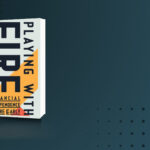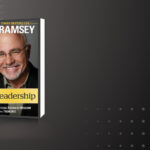
Book summary: Playing with FIRE by Scott Rieckens
September 5, 2024
Book Summary: Entreleadership by Dave Ramsey
November 29, 2024Mihaly Csikszentmihalyi’s Flow is a pioneering work that explores the science behind what makes life fulfilling. The concept of “flow,” where one is fully absorbed in an activity and experiences a sense of timelessness, is central to his theories. According to Csikszentmihalyi, flow is not just a state of optimal performance but a key to long-term happiness. In this expanded article, we’ll dive deeper into six transformative lessons from the book and how you can apply them to lead a more satisfying, engaged, and productive life.
1. Happiness Comes from Engagement, Not External Stuff
Csikszentmihalyi’s research fundamentally challenges the idea that happiness is derived from external achievements like money, fame, or social status. Instead, he argues that happiness is a byproduct of being fully engaged in life’s activities. Modern society often emphasizes material success as the ultimate goal, yet many people who attain it report feeling unfulfilled. This paradox, Csikszentmihalyi suggests, can be explained by how we allocate our attention and energy.
He points out that passive activities, like mindlessly watching TV or endlessly scrolling through social media, rarely bring deep satisfaction. These activities don’t engage our minds or bodies in meaningful ways. In contrast, active engagement—like learning a musical instrument, participating in sports, or even solving puzzles—has a profound impact on our well-being. These activities provide a sense of accomplishment and joy because they require us to use our skills and fully focus our attention.
Consider this: If you’ve ever spent hours working on a DIY project, engrossed in every detail, you probably felt a sense of pride and joy afterward. This feeling comes from investing your attention in something meaningful. Csikszentmihalyi emphasizes that we must consciously choose activities that engage us. Rather than looking for happiness in external rewards, we should seek fulfillment through active participation in life.
Practical Application:
- Identify activities that genuinely engage you and commit to doing them regularly. It could be cooking, hiking, painting, or even volunteering for a cause you care about.
- Limit passive leisure and instead focus on hobbies that challenge you and make you feel accomplished. You might not feel motivated initially, but the long-term benefits to your mental well-being are significant.
2. What is Flow, and Why Does It Matter?
The concept of flow is central to Csikszentmihalyi’s work and is described as a state of deep absorption where one’s sense of time disappears, and the activity itself becomes intrinsically rewarding. Think of flow as the ultimate form of mindfulness. When in flow, your mind doesn’t wander, your worries fade, and you’re completely present in the moment. Athletes call it being “in the zone,” artists refer to it as “being in the groove,” and scientists experience it when they’re deep in a problem-solving process.
Flow can be experienced in various activities, from sports and art to coding or even cooking. However, certain conditions are necessary to enter this state. Csikszentmihalyi identifies three main components:
- Clear Goals and Objectives: Knowing exactly what you’re working toward gives you direction and purpose. Ambiguity, on the other hand, can lead to frustration.
- Immediate Feedback: Whether it’s the sound of a piano note you’re playing or the visual confirmation of a puzzle piece fitting into place, feedback helps you adjust and stay engaged.
- Challenge-Skill Balance: This balance ensures the activity is neither too easy (which causes boredom) nor too difficult (which causes anxiety). This aspect is crucial to maintaining the flow state.
Why Flow Matters:
Achieving flow is more than a feel-good experience. Studies show that people who experience flow regularly report higher levels of satisfaction, productivity, and creativity. Flow enhances learning, improves work performance, and even contributes to a sense of purpose. Moreover, Csikszentmihalyi found that people who frequently engage in flow-producing activities tend to be happier overall.
Practical Application:
- When setting goals for a task, ensure they are specific and measurable. This will keep you focused and motivated.
- Reflect on how you can receive feedback on your work. This could be through self-assessment, peer reviews, or even using apps that track your progress.
- Experiment with adjusting the difficulty of your tasks. If something feels too easy, introduce new challenges. If it feels overwhelming, simplify the task into manageable steps.
3. Balance Challenge and Skill to Find Flow
One of the most actionable insights from Flow is understanding the importance of the challenge-skill balance. For an activity to be engaging, it needs to push your abilities but not be so difficult that it causes stress or anxiety. Think about a game of chess: if you’re playing against a much more skilled opponent, you’re likely to feel defeated quickly. On the other hand, playing against a novice can feel uninteresting. The key is finding an opponent or a task that matches your skill level but also challenges you to improve.
Csikszentmihalyi explains this concept using a flow channel, which is a balance between anxiety and boredom. If you’re outside this channel, you’re either overwhelmed or disengaged. For optimal engagement, regularly recalibrate the difficulty level of your activities. This balance is why many people find video games addictively fun; the game adjusts its difficulty as you become more skilled.
Work and Hobbies:
At work, this concept can be transformative. If you feel under-stimulated, consider taking on new responsibilities or projects that challenge you. Conversely, if you’re feeling stressed, break down complex projects into smaller tasks to regain control. The same goes for hobbies. If you’re learning guitar, for instance, gradually increase the complexity of the songs you play to stay motivated.
Practical Application:
- At work, periodically review your tasks. Are they too easy or too hard? Adjust your responsibilities accordingly, or discuss new challenges with your supervisor.
- In your personal life, pick hobbies that can grow with you. For example, if you enjoy running, aim to improve your pace or distance over time.
4. Purpose Makes Life More Meaningful
Having a clear purpose gives your life direction and a sense of meaning. Csikszentmihalyi found that people who feel connected to a greater purpose tend to be happier and more resilient. Your purpose doesn’t need to be grand or world-changing; it just needs to be something that inspires and motivates you. Whether it’s raising a family, creating art, or working for social change, having a unifying goal can make daily challenges feel more manageable.
Purpose can act as a guiding principle, helping you prioritize and make decisions that align with your values. Csikszentmihalyi suggests thinking of your life as a narrative where each chapter contributes to a larger story. This approach helps people make sense of their experiences and gives them a sense of continuity and coherence.
Finding Your Purpose:
Ask yourself what activities make you lose track of time, and consider how these could be aligned with a purpose. Sometimes, purpose can be found in small, everyday actions, like mentoring a colleague or volunteering for a community project. Over time, these actions can lead to a greater sense of fulfillment.
Practical Application:
- Reflect on what gives your life meaning and how you can align your daily activities with this purpose.
- Write a personal mission statement that outlines your values and goals. Use this statement as a compass to guide your actions and decisions.
5. You Can Find Flow at Work and During Free Time
Csikszentmihalyi challenges the assumption that work is inherently boring and that only leisure activities can be enjoyable. In reality, work often provides more opportunities for flow because it usually involves structured challenges and clear goals. People who find ways to experience flow at work report higher job satisfaction and greater productivity.
If your job feels monotonous, consider setting personal benchmarks to make tasks more engaging. For example, if you’re in sales, aim to break your previous record. If you work in a creative field, experiment with new techniques or approaches. On the flip side, your leisure time should be more than just passive activities. Watching Netflix or scrolling through your phone can be enjoyable in moderation, but they don’t provide the engagement necessary for flow.
Active vs. Passive Leisure:
Active leisure activities, like learning a language, hiking, or painting, are more likely to result in flow and leave you feeling refreshed and accomplished. Csikszentmihalyi recommends incorporating more active pursuits into your free time to maximize happiness and personal growth.
Practical Application:
- At work, look for opportunities to make your tasks more engaging. This could involve taking on a new project or improving your workflow.
- During your free time, replace some passive activities with hobbies that challenge and engage you. You’ll find that this leads to a greater sense of fulfillment.
6. Handling Hard Times with a Growth Mindset
Life is unpredictable, and Csikszentmihalyi emphasizes that our ability to handle difficulties largely depends on our mindset. He introduces the concept of an autotelic personality, describing people who are intrinsically motivated and find joy in the experience itself, regardless of the outcome. These individuals view challenges as opportunities to grow rather than threats to be avoided. They are better equipped to deal with stress and are more likely to bounce back from setbacks.
Cultivating a growth mindset can transform how you experience adversity. Instead of feeling defeated by obstacles, try to see them as chances to learn and improve. For example, if you fail at a work project, analyze what went wrong and how you can do better next time. Csikszentmihalyi suggests that even in the most challenging situations, we can find moments of flow by focusing on what we can control and actively working to improve our circumstances.
Practical Application:
- Practice reframing setbacks as opportunities for growth. This can be as simple as changing your self-talk from “I failed” to “I learned something valuable.”
- Develop habits like gratitude journaling or mindfulness meditation to build resilience. These practices can help you stay grounded and optimistic during tough times.
Conclusion
Mihaly Csikszentmihalyi’s Flow is a masterclass in living a more meaningful, engaged life. By understanding how to achieve flow—through balancing challenge and skill, aligning your actions with your purpose, and cultivating a growth mindset—you can transform your daily experiences. Whether at work or in leisure, the principles of flow can boost your productivity, enhance your focus, and increase your overall sense of well-being.
This in-depth exploration provides a roadmap to apply these transformative ideas in your life. Remember, the goal isn’t just to achieve fleeting moments of happiness but to build a life that feels deeply fulfilling and purposeful.

